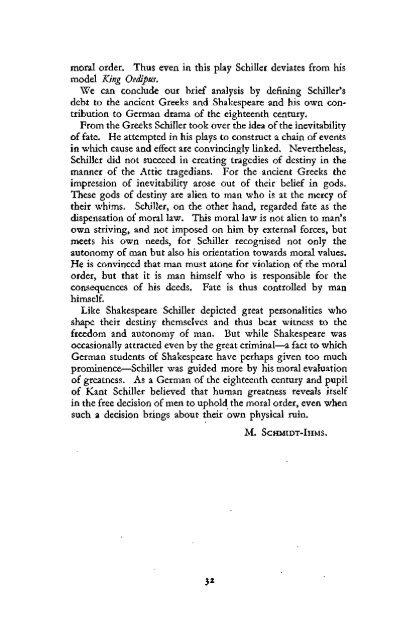Theoria - DISA
Theoria - DISA
Theoria - DISA
Create successful ePaper yourself
Turn your PDF publications into a flip-book with our unique Google optimized e-Paper software.
moral order. Thus even in this play Schiller deviates from his<br />
model King Oedipus.<br />
We can conclude our brief analysis by denning Schiller's<br />
debt to the ancient Greeks and Shakespeare and his own contribution<br />
to German drama of the eighteenth century.<br />
From the Greeks Schiller took over the idea of the inevitability<br />
of fate. He attempted in his plays to construct a chain of events<br />
in which cause and effect are convincingly linked. Nevertheless,<br />
Schiller did not succeed in creating tragedies of destiny in the<br />
manner of the Attic tragedians. For the ancient Greeks the<br />
impression of inevitability arose out of their belief in gods.<br />
These gods of destiny are alien to man who is at the mercy of<br />
their whims. Schiller, on the other hand, regarded fate as the<br />
dispensation of moral law. This moral law is not alien to man's<br />
own striving, and not imposed on him by external forces, but<br />
meets his own needs, for Schiller recognised not only the<br />
autonomy of man but also his orientation towards moral values.<br />
He is convinced that man must atone for violation of the moral<br />
order, but that it is man himself who is responsible for the<br />
consequences of his deeds. Fate is thus controlled by man<br />
himself.<br />
Like Shakespeare Schiller depicted great personalities who<br />
shape their destiny themselves and thus bear witness to the<br />
freedom and autonomy of man. But while Shakespeare was<br />
occasionally attracted even by the great criminal—a fact to which<br />
German students of Shakespeare have perhaps given too much<br />
prominence—Schiller was guided more by his moral evaluation<br />
of greatness. As a German of the eighteenth century and pupil<br />
of Kant Schiller believed that human greatness reveals itself<br />
in the free decision of men to uphold the moral order, even when<br />
such a decision brings about their own physical ruin.<br />
32<br />
M. SCHMIDT-IHMS.
















